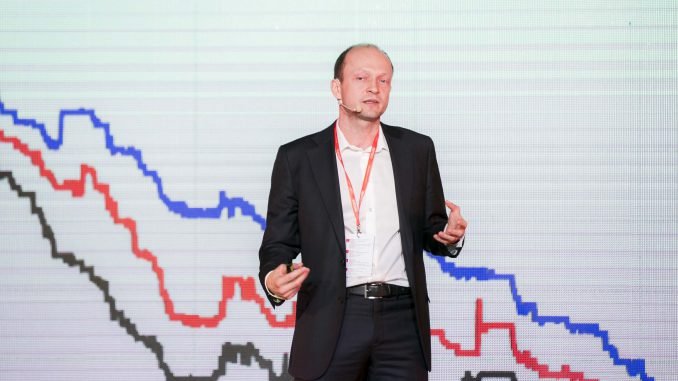
The second decade of the 21st century, which was also the third decade after the re-establishment of the Republic of Lithuania, was exceptionally high. The 2010s in Lithuania were marked by a rapid rise of personal income and living conditions, declining poverty and undeniable social progress, wrote Nerijus Mačiulis, the Chief Economist at Swedbank.
Lithuania was in deep trouble at the beginning of the decade. After the global financial crisis, the GDP of the state was equal only to five-sixths of the pre-crisis high. Nevertheless, the recovery from the crisis was impressive. The GDP per capita based on purchasing power parity (PPP) for Lithuania was the fastest growing in the European Union and reached 80 per cent of the EU average.

The 2010s in the neighbourhood of Lithuania were full of geopolitical and economic shocks. Soon after the 2008 financial crisis, the European sovereign debt crisis started. It raised questions over the solvency of Greece and several other large Mediterranean countries. Their future in the eurozone was also in doubt. Meanwhile, Lithuanian agricultural, food and transport sectors were affected by the conflict between Russia and Ukraine, followed by Russian food embargo in the middle of the decade. Ultimately, for the past two years, many of Lithuania’s export markets have suffered from the rising number of protectionist policies and increasing import tariffs.
Remarkable exports
However, none of these shocks stopped Lithuanian exports and the whole economy from growing rapidly during the decade. The export of Lithuanian goods more than doubled, while the export of high value-added products, such as pharmaceutical drugs, computer hardware, electronic equipment and optical instruments, nearly tripled. Even more impressive was the growth in the export of services. In general, service exports increased three and a half times, while the export of IT, communication and other business services increased six-fold.
Usually, it is not appropriate to talk boastfully and overconfidently, but Lithuanian companies managed to establish themselves in new export markets and increase their exports more successfully than their counterparts from neighbouring countries. The 2010s saw Lithuania doubling its portion of global service exports, whereas Estonia’s and Latvia’s shares did not change. In addition, at the end of the decade, Lithuania’s trade-to-GDP ratio became higher than the Estonian one for the first time. Thus, Lithuania has become one of the most open economies not only in the European Union but also across the whole world.
Naturally, successful expansion to new export markets was reflected in Lithuanians’ finances. Compared to the start of the decade, the net average monthly salary grew by 77 per cent from 464 to 820 euros. In the meantime, Lithuania’s net minimum monthly wage more than doubled, while the average old-age pension increased from 215 to 345 euros. The labour share of GDP rose to its highest level since the restoration of independence. It reached nearly 50 per cent, which is close to the average of the European Union.
About the prices
Although it may not be crystal clear for everyone, prices increased at a much slower pace than personal income in the 2010s. Food prices became higher by 22 per cent, apparel and footwear prices remained virtually unchanged, whereas telecommunication services became cheaper by a one-fifth. Costs of professional services grew faster than product prices, but their increase was also smaller than personal income growth.
To put it another way, even bearing price growth in mind, most of the residents of Lithuania now can afford far more goods and services. This is proven by the actual individual consumption (AIC) results for Lithuania, which has improved from 66 per cent to 89 per cent of the EU average, putting Lithuania on a par with Spain. Enhancing quality of life and increasing number of opportunities are also reflected in the fact that not only necessity goods became more affordable, but also that 36 per cent of Lithuanians went on holiday abroad in 2018, compared with 17 per cent a decade ago.
The decade saw the unemployment rate dropping from 17.5 per cent to 6 per cent, while the employment rate reached record heights and exceeded the European Union average. The activity of older men and women in the labour market also hit historic highs. Possibly because of this reason, it is not surprising to see that the rate of severe material deprivation dropped to the lowest level since the beginning of the 1990s, although we need to admit that there is still room for improvement.
Changing personal habits
Increasing personal income and employment rate led to changes in people’s behaviour and priorities. Alcohol consumption per resident older than 15 dropped by nearly 20 per cent in the 2010s. Simultaneously, the number of deaths caused by alcohol-related diseases dropped by half. The number of car accidents caused by an alcohol-impaired driver also fell.
Even though surveys show that almost one in two Lithuanians still does not do sports regularly, the number of participants in the 2019 Vilnius marathon rose four times over ten years. In larger cities, there are plenty of gyms and various activities to take up from yoga and call antics to wakeboards, capoeira and functional training. That is why perhaps it is not surprising that the average life expectancy at birth increased by four years for both males and females.
Even though Lithuania lost 280 thousand residents due to emigration during the decade, Lithuanians, though living abroad, did not vanish. Furthermore, for the first time, we saw more people coming to Lithuania than leaving the country in 2019. Being aware of the economic and social progress our country has made in this decade, it is plausible that the repatriation of Lithuanians will continue in the new decade too.
The turn of the decade is an excellent opportunity to forget temporary problems, quarterly plans and annual budgets briefly, enjoy outstanding personal, professional and national achievements of the 2010s and think what should be done in order to make 2020s as good as this decade was.

Be the first to comment